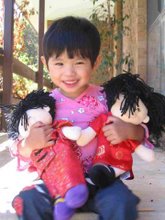This festival is known as the Moon Festival and is held each year on the 15th day of the eighth lunar month (in 2007 this is Wednesday 26 September). Because the lunar month starts on a new moon, it is always a full moon on the festival (and the full moon rises at sunset).
On this day people enjoy sitting outdoors admiring the full moon while eating moon cakes (yuèbĭng) and fruits such as pomelo (yòuzi).
The round shape (ie the full moon) to the Chinese symbolises family unity. Therefore the Moon Festival is a holiday for members of the family to get together wherever possible. On that day children will bring their family members back to their parents' home for a reunion.
During Moon Festival all types of lanterns - and especially colourful, animal shaped paper lantern - decorate houses. Moon Festival alters are adorned with five dishes of round fruits, such as apples, peaches, pomegranates, grapes and small melons - the round shape symbolising both the moon and family unity
For adoptive families a great book to read at this time (or anytime) is 'We see the moon' by Carrie A Kitze, EMK Press. A wonderful way to 'connect' with birth family in China and beautifully illustrated with Chinese Peasant Art.
The Legends
During the Yuan dynasty (AD 1280-1368) China was ruled by the Mongolian people. Leaders from the preceding Sung Dynasty (AD 960-1280) were unhappy at submitting to foreign rule and set out to coordinate a rebellion without being discovered. The leaders of the rebellion, knowing the Moon Festival was drawing near, ordered the making of special cakes. Each cake contained a message outlining the attack. On the night of the Moon Festival the rebels successfully attacked and overthrew the government and the Ming dynasty (AD 1368-1644) was created. Today moon cakes are eaten to commemorate this legend.
The Lady - Cháng'é
There is a legend that thousands of years ago there were 10 suns in the sky and it was burning hot on earth. An archer, Hòuyì, bravely shot down nine of the suns and saved the earth from famine. He was beloved among the people and they made him a king. He was also awarded pills of immortality by the goddess Wángmŭ Niángniang. The pills were for both him and his wife Cháng'é, but Cháng'é was curious and could not resist the temptation of immortality. She secretly took all the pills herself, which not only made her immortal but also floated her to the moon to live forever.
The Man - Wu Kang
Wu Kang was a shiftless fellow who changed apprenticeships all the time. One day he decided that he wanted to be immortal. Wu Kang then went to live in the mountains where he importuned an immortal to teach him. First the immortal taught him about the herbs used to cure sickness, but after three days his characteristic restlessness returned and he asked the immortal to teach him something else. So the immortal taught him chess, but after a short while Wu Kang's enthusiasm again waned. The Wu Kang was given the books of immortality to study. Of course, Wu Kang became bored within a few days and asked if they could travel to come new and exciting place. Angered with Wu Kang's impatience the master banished Wu Kang to the Moon Palace telling him that he must cut down a huge cassia tree before he could return to earth. Though Wu Kang chopped day and night the magical tree restored itself with each blow and thus he still up there chopping.
Subscribe to:
Post Comments (Atom)

No comments:
Post a Comment